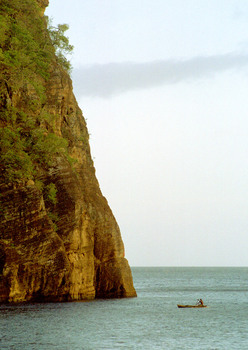The purpose of this column is simple: I want us to stop beating, abusing and neglecting our women and to start loving, respecting and learning from them instead. And lest you expat men think yourselves exempt from this; you’re not. I’ve seen ni-Vanuatu women treated despicably by black and white alike.
If I seem angry, that’s because I am. I have encountered instances of children solicited for sex, fathers turning their wives out and taking up with their under-age daughters, dozens of cases of rape and abuse, and some acts of violence that would make your blood curdle.
None of these appeared in the news or even in the crime statistics. Few of them were ever dealt with under law or kastom. It’s as if they don’t exist.
Southern trees bear strange fruit,
Blood on the leaves and blood at the root…
These are the opening lines of a song made immortal by American Jazz singer Billie Holiday. Her personal story was heroic; battling poverty, marginalisation, racism and abuse, she managed to become one of the most influential singers of the 20th Century.
‘Strange Fruit’, Holiday’s signature tune, became a hallmark of a quickening social sensitivity to the plight of black people in America. Provocative, courageous and compelling, its twelve short lines could reduce even the most jaded listener to tears.
The song’s central image is the victim of a lynching, the ‘strange fruit’ hanging from a tree. Holiday, who had been raped at 11 and prostituted by 14, and who faced a lifetime of drug addiction and domestic abuse, made it a vessel into which she poured all of her pain and suffering.
Vanuatu has its own strange fruit: Planted between the roots of a nakatambol tree lie the bones of a Tannese woman murdered, burned and discarded after 14 years of neglect by her own people. An overgrown lot in Freswota is aflower with yellow crime scene tape marking the place where another young Tannese woman was raped and beaten to death with a timber. Her 3 year old daughter lay strangled nearby.
Just as the mightiest tree often comes from the smallest seed, Vanuatu continues to reap this bitter harvest because, in every aspect of their lives, women are subject to coercion.

 A shocking story is emerging from the Northern Vanuatu island of Maewo. Last week, two brothers, fugitives from Kaiovo village, appeared at Lolowei Hospital on neighbouring Ambae island. One was treated for injuries. Witnesses said he claimed he had been stoned following a village meeting. The other walked onward to Tumsisiro, an Anglican mission, and requested sanctuary.
A shocking story is emerging from the Northern Vanuatu island of Maewo. Last week, two brothers, fugitives from Kaiovo village, appeared at Lolowei Hospital on neighbouring Ambae island. One was treated for injuries. Witnesses said he claimed he had been stoned following a village meeting. The other walked onward to Tumsisiro, an Anglican mission, and requested sanctuary.